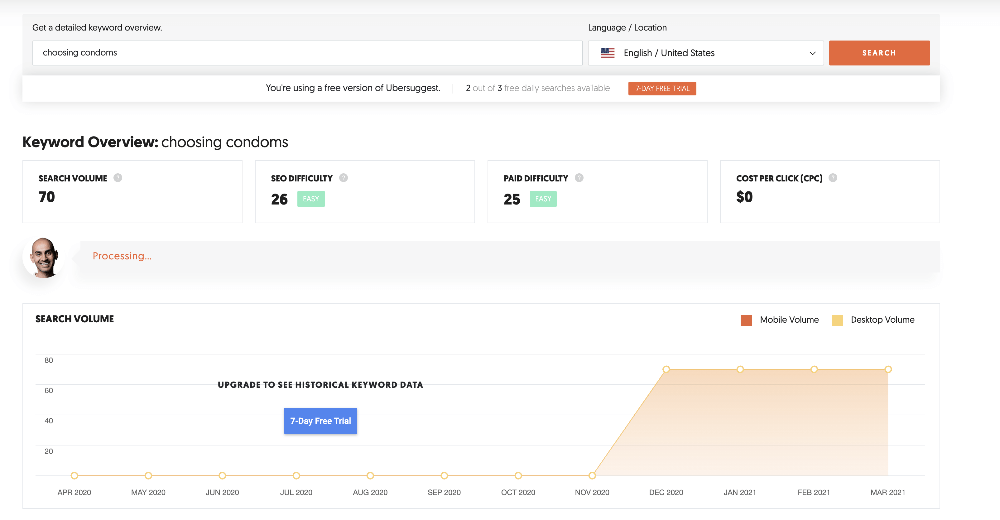SEO Keywords: How to Research and Choose Good Keywords
Today we’re going to delve into the world of SEO. Before we begin I want to say upfront that SEO is as much art as it is science. There is no magical formula I can give you which, if you follow it to the letter, will get your blog to page one on Google. Perhaps back in ye olden days, when Google’s algorithm was a simple tool to assess page relevance, your beautifully keyworded article could have launched you onto page one. But these days the Google algorithm takes into account so much more (inbound links, time users spend on a page, mobile usability, loading speed, E-A-T, etc etc) that keywords alone are no guarantee of success.
They are, however, still important. Most people’s online journeys begin with keywords or phrases, and by understanding how to choose the right ones you can give your own work a better chance of success in the rankings.
What is a keyword?
 A keyword is a word (or more often a phrase) that you use prominently in your article, to tell users what it is about. Although many people will say – for shorthand – that a keyword is for Google, it is far more useful to think of them as user-focused tools. If I write an article about choosing the right condom, I want to make sure that it’s clear at first glance, when a user lands on a page, that this article will help them choose the right condom.
A keyword is a word (or more often a phrase) that you use prominently in your article, to tell users what it is about. Although many people will say – for shorthand – that a keyword is for Google, it is far more useful to think of them as user-focused tools. If I write an article about choosing the right condom, I want to make sure that it’s clear at first glance, when a user lands on a page, that this article will help them choose the right condom.
I would call it something like “Choosing condoms: find the right condom for you.” Then I would make sure that throughout the article I use plenty of language that echoes this. In subheadings: “How should I choose a condom?” In my intro: “In my own sex education classes I was never given much info about choosing condoms for particular tasks, so today I want to show you how to choose a condom that’s right for you rather than grabbing any old one off the shelf.” And then throughout the piece too.
The Google Algorithm
When Google crawls your page, it will pick up on the keywords that you’ve used and the algorithm will understand how to categorize your piece. More importantly, the algorithm wants to make sure users find what they’re looking for. Google doesn’t want to send a user to an article that includes the phrase “choosing condoms” seventy times but is hard to read or fails to give the user the answers they want.
Remember when I said the algorithm takes into account more than just keywords? One of the things it’s looking out for is whether users actually stay on the page to enjoy the content, or whether they click away because it’s not right. Think of your keywords like the packaging of your product (the content). They need to be clear, descriptive, and make your product (content) easy to identify. But they shouldn’t take over and become the whole product themselves.
How do you find good keywords?
There are a number of tools you can use to find keywords, but the three tools I tend to use most often are:
- Google Keyword Planner
- Ubersuggest
- Other websites/blogs
Google Keyword Planner
Google Keyword Planner is a tool offered by Google itself, which allows you to input a keyword/phrase (or a selection!) and find out how often that term is searched for in whichever geographical area you’d like to target. It will also sometimes suggest other keywords/phrases that you might want to consider.
For instance, I typed “choosing condoms,” “how to choose a condom,” and “condom sizes” into Google Keyword planner, then did what Smutlancer’s always have to do and unticked the option to “exclude adult ideas,” which is on by default because Google is a pearl-clutching Victorian Aunt.
The tool tells me that those three key phrases are all highly competitive (meaning there are lots of sites that are targeting them), and that “condom sizes” get between 1000-10,000 searches per month. The other two get between 100-1000. So for my article, I’m going to have to work extremely hard to rank well for those terms. Even if I do, I may well not see the huge traffic increase I’d hope for.
It also suggests over 1,500 other keywords I might like to consider, though, and looking at the suggestions it offers I can see there are some relatively low-competition phrases surrounding “condom chart” or “condom measurement chart.” Do I want to include this in my article? If I do, I might be able to target those keywords and nab a bit of the traffic that other people are not working so hard to compete for.
Ubersuggest

Ubersuggest is a free tool, and it’s brilliant. (Though you can get lots more data if you want to upgrade to the paid version, I’d strongly recommend having a good poke around the free one first.) It gives you keyword ideas, suggestions for the exact articles you’ll be competing against, and it’ll also do you a site audit which will show up any easy-to-fix problems with your own SEO.
When I put ‘choosing condoms’ into Ubersuggest, I get a few new examples (like “how to pick the right size condoms” or “how to find the right condoms”) that I may want to use. On top of that, I also get a list of articles that already rank well for those keywords. This is gold because it feeds neatly into the third and final thing I find helpful when picking keywords…
Other blogs/websites
I am far from an expert in SEO. Eight years ago I’d have said I was, but as you know a lot changes in even a single year on Google, and I think I’m a little rusty. You know who is an expert, though? Loads of other people! The people who get to page one on Google!
This may sound obvious, but one of the most useful things you can do for your own keyword research is a few searches of your own. Open up a private browsing tab, and search around the topic area you’re covering. Look at the top articles. What have they included that you don’t have? Which questions are they answering? How are they framing their content? Naturally, you don’t just want to copy what someone else does – that’s a) cheating b) bad for your own SEO, and c) not fun at all. But if you’re writing an advice guide, review, overview, or anything along those lines, looking at what other people have done can help show you where there are areas of improvement for your own work.
Pick a keyword, write a piece
When I read articles about SEO, the key takeaway is always “total exhaustion.” I get tired just thinking about the sheer amount of work involved in writing a really nicely targeted piece. Honestly, I don’t do this kind of research for everything I write, relying more often on instinct and good practice than meticulous research. But if you do it a few times with important articles, you’ll start to get a feel for what works and what doesn’t, as well as what people most naturally search for.
Put it into practice on your next piece, and then another, until it starts to become second nature. I promise, when you’ve done it for a while, you will never again publish a blog post entitled purely “Thoughts and musings.” Instead, you’ll publish “Choosing condoms: thoughts on how to pick the best condom for you.”
Want to learn more about SEO? Check out the entire Smutlancer SEO Series!
